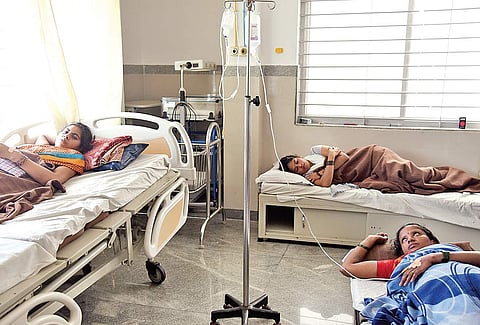

NEW DELHI: A mega plan to allow takeover of government hospitals in the districts by private players is on the drawing board. If the plan passes muster, private players will also be responsible for establishing and running medical colleges that can be attached to the secondary healthcare centres they get to control.
The Centre’s top think tank Niti Aayog has released a 250- page document on “Scheme to link new and/or existing private medical colleges with functional district hospitals through PPP” for feedback from stakeholders.
A stakeholders’ meet is slated for later this month. Such district hospitals need to have at least 750 beds — nearly half as “market beds” and the rest as “regulated beds”. Market beds would have a market price tag, which would help subsidise the regulated beds. “It is practically not possible for the Central/state government to bridge the gaps in the medical education with their limited resources and finances,” the document reasons, underscoring the need for the scheme to “augment medical seats and also rationalize costs of medical education”.
The guiding principles for the public-private participation scheme are based on the international best practices, officials said. Under this, the concessionaire will design, build, finance, operate and maintain the medical college and also operate and maintain the associated district hospital.
“These guidelines can be adopted by interested states particularly those struggling to infuse funds in the healthcare sector and where district hospitals are not up to the mark,” said a senior Aayog functionary. The draft, prepared after wide consultations, says the model will resolve the issues of shortage of medical colleges and upgradation of district hospitals. Public health activists are, however, sceptical.
“This policy will further compromise quality and access to healthcare, mainly for poor patients,” said Dr Abhay Shukla, national co-convenor, Jan Swasthya Abhiyan. “Our public healthcare facilities, built over decades, need investment; it’s like handing over an unpolished jewel to someone else saying we don’t have resources to polish it. It’s a ridiculous argument since our healthcare spending is one of the lowest in the world,” he added.
The JSA and the Association of Doctors for Ethical Healthcare have decided to write to the government opposing the proposal. Priya Balasubrahmaniam of the Public Health Foundation of India said that in such arrangements, even if some beds are meant to be free, patients who are not paying can become “low priorities or can be turned down on various pretexts. It can be difficult to fix accountability on private parties in such a model”.
Apprehension
A number of public health activists, however, expressed strong apprehension over the scheme as district hospitals are seen as the last port of call for a majority of the most vulnerable patients in the country